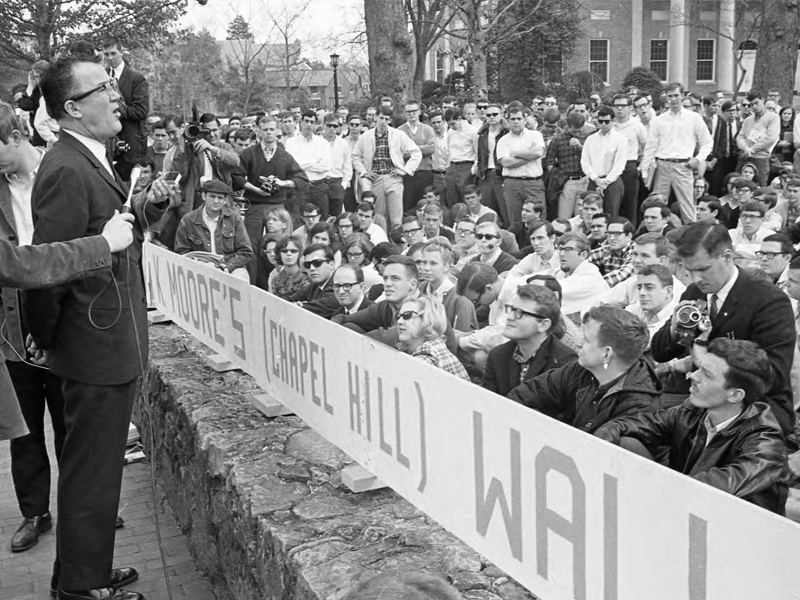
In 1963 the North Carolina State Legislature passed the Speaker Ban Law, which restricted free speech at public schools like UNC Chapel Hill. Two years later a group of student leaders, including Campus Y co-president Jim Medford, petitioned the Chancellor to allow two non-approved writers to lecture on campus. As expected, their request was denied; but they were not deterred. The group moved forward with its plan and invited the speakers to deliver speeches from the sidewalk of Franklin Street, just inches off of UNC’s property. This act of civil disobedience brought national attention to UNC and to the Speaker Ban Law, which was ruled unconstitutional soon after in 1968. After graduating from Carolina, Medford continued to tackle injustices by studying at Harvard Law School and subsequently practicing law for the next forty years.
Today, the Campus Y continues to empower Tar Heels like Medford to see themselves as changemakers. The Y’s 32 student-led committees and three staff-led programs allow students to develop their voice and values while exploring their career aspirations.
Although political and social issues may change through the decades, taking part in advocacy and direct service work at the Y consistently inspires students to dedicate their lives to tackling their era’s most pressing issues – like education policy, environmental justice, and human rights – through law. Meet seven recent Campus Y alumni who are current law students or recent law alumni in the Q&As below to learn more.
Amber Koonce ’12
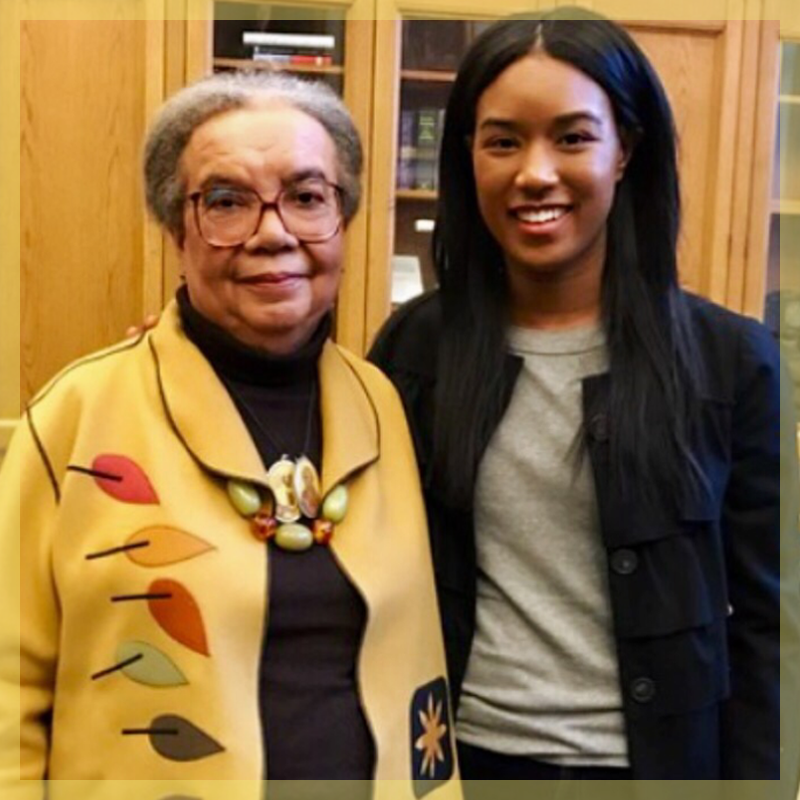 How did the Campus Y shape your time at Carolina and your post-graduation goals?
How did the Campus Y shape your time at Carolina and your post-graduation goals?
My involvement in the Campus Y defined my time at Carolina. Working with children incarcerated in Durham, NC, through Criminal Justice Awareness and Action (CJAA), opened my eyes to the harsh ways in which our justice system treats young people who are often lacking support, care, or guidance at home. The four years I spent with those children solidified my commitment to advocating for the rights of incarcerated children after college.
Through UNC NOW, the Campus Y steeped me in a community of student activists working alongside community organizers from the Northside. The Northside community taught me invaluable lessons about how to use people power to challenge monied interests when they threaten the sustainability of working-class and minority communities.
What inspired your decision to go into law?
I went into law because my experiences working with public policy and community organizing in college taught me that politics can often thwart progress from being made. I viewed law as a mechanism that would compel the state to respond to the needs of its most vulnerable members, even when it was not politically popular.
What would you say to Campus Y students considering law school?
If you are a Campus Y student committed to contributing to the creation of a more just society, then I would advise you to approach law school with an understanding that the way our current legal system is organized is a part of the problem. Learn our legal system with a view towards transforming our legal system.
Give us a few sentence description of the work you’re doing now.
Today, I work as a Civil Rights Fellow for the NAACP Legal Defense Fund and the law firm Fried Frank. In this capacity, I have contributed to cases ranging from issues of access to contraception to investigations into sexual harassment. One of my most interesting cases involves a young man who was sentenced to life in a maximum security adult prison when he was just 15 years old; he is now 32. (The photo to your left features Amber and Children’s Defense Fund Founder, Marian Wright Edelman).
What are you most proud of?
I’m going to shift this question to what I am most grateful for. I am grateful that the Campus Y provided me with a space where my ideas and curiosities were taken seriously, where I was able to not only dream of a more just society, but to also work towards this goal.
Hetali Lodaya ’14
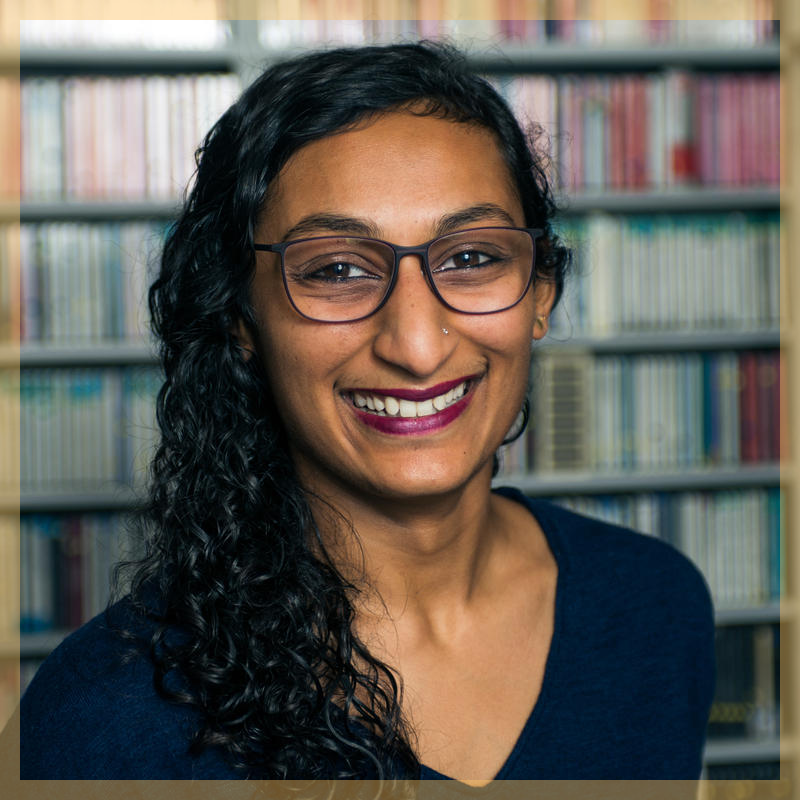 How did the Campus Y shape your time at Carolina and your post-graduation goals?
How did the Campus Y shape your time at Carolina and your post-graduation goals?
Fundamentally! The Y is where I learned about things like social justice, community-based work, social entrepreneurship, eating/buying local, and being engaged with the community you live in. All of those ideas and concepts have shaped my life since then, both in terms of my career and my personal life.
What inspired your decision to go into law?
I have always been interested in education, and I studied Chemistry in addition to Public Policy at UNC. For a while thought I would work in STEM education, or increasing the presence of women and minorities in STEM fields. The more and more I learned about issues with STEM education, however, the more I realized that there were just some basic, systemic problems with our K-12 education system as a whole. I wanted to figure out how to address those systems-level issues. I wasn’t sure whether I wanted to do it through business, or policy, or legal work, but studying the law felt like the right place to start.
What would you say to Campus Y students considering law school?
LOTS of people will tell you that if you’re trying to change or improve the world, law is the wrong way to do it. I actually don’t agree with that premise, but I do agree that there are things about using the law to advance civil rights and social progress that are harder or different than they seem from the outside, and that it is not the right channel for doing this work for everyone. So, do your research. Talk to people who have jobs that you think you might want to have, based on what you know now, and get into the nitty gritty with them. What do they spend their time doing every day? Why did they go to law school? Do they feel like they are able to do what they envisioned doing? I think it’s particularly helpful to talk to people who were organizers or did some other work directly with people before starting law school. Do they miss that work and that connection with the community? Why did they make the switch?
We need more lawyers across the entire field – working at big law firms as well as working at traditional “public interest” jobs – who have a background in and care about civil rights and social justice. So I’m not saying you shouldn’t go to law school! Just do it with eyes wide open to the personal, financial, and work-based challenges you may face and with a plan as to how you’ll face them.
What have you been up to since graduating in 2014? What do you hope to do with your law degree when you graduate from the University of Michigan?
I did the Venture for America fellowship, which was an incredible opportunity to further pursue my interests in social entrepreneurship and community-based work with a big group of like-minded peers. I worked at an education nonprofit for two years in San Antonio, TX, and loved it. A lot of Y alumni have gone on to do VFA, and both those that came before me and after me are huge inspirations!
After three years working, I started school. I am currently pursuing a dual JD/Master’s in Education Policy at the University of Michigan. I’m in the middle of my summer internship at a civil rights law firm in Chicago, doing a lot of work related to police, wrongful convictions, and prisons. I absolutely love it, and am in the midst of trying to figure out what a career in civil rights litigation looks like for me. Long-term, I would love to potentially be a clinical professor – these are the people who run clinics at law schools, which provide legal services to folks who could not otherwise access them while also giving law students the chance to do real legal work and understand their skills and passions.
What are you most proud of?
The ways that a community-based mindset has served me time and time again in the first few years of my career/graduate school. It ALWAYS matters to be working with, not just for, the people you want to serve. Never forget that!
Dinesh McCoy ’15
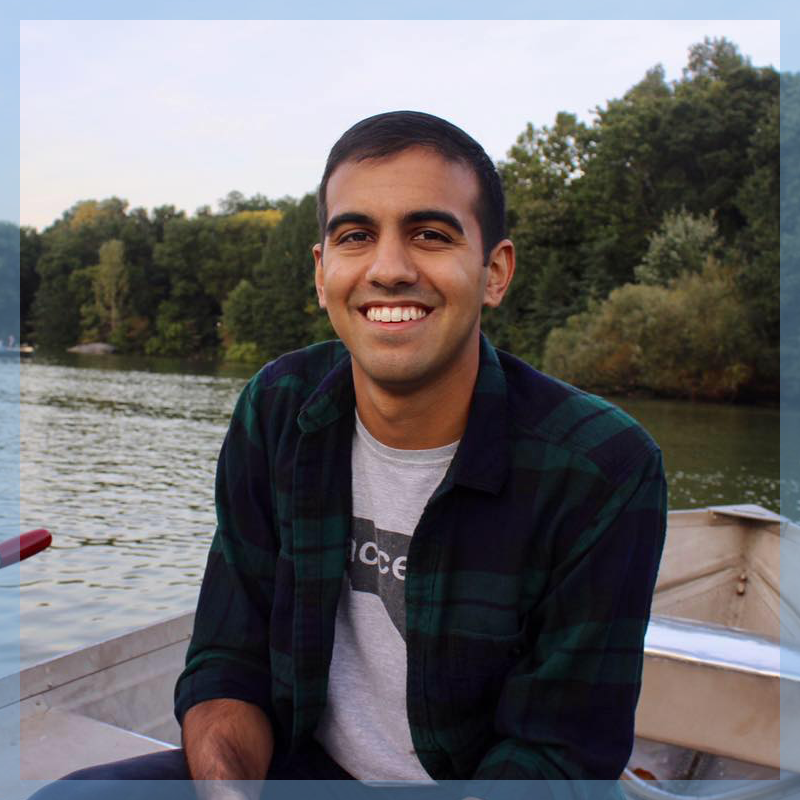 How did the Campus Y shape your time at Carolina and your post-graduation goals?
How did the Campus Y shape your time at Carolina and your post-graduation goals?
The Campus Y was fundamental in grounding me in a community of people that challenged me to rethink my ideas related to public service and social justice. I came into UNC interested in public policy and a very top-down model of social change, and generally was very interested in politics and political science. The people I met in the Campus Y challenged me to think more about grassroots change and struggling in solidarity with the people most impacted by societal and structural injustices.
The people I met through the Y are people I am still connected to and that I talk to all the time when thinking about my own goals and plans. Since I graduated, I’ve worked in a variety of social justice-focused organizations, and I’m trying to learn from each of them about how I can use lawyering and other tools in support of progressive social movements. I started out as a legal assistant at the ACLU’s national office in NYC, and then came back to NC as a college adviser with the Carolina College Advising Corps. Both of those experiences really grounded me before heading to law school, and were really invaluable in helping me think about what I wanted out of my grad school experience.
What inspired your decision to go into law?
Really what inspired me was people I knew already who were doing social justice-oriented legal work, including people I was connected to through the Campus Y. During my time at UNC I was fortunate to meet civil rights lawyers in the Triangle area, and saw the work they were doing in conjunction with the NAACP’s Moral Monday organizing or the work of fighting environmental racism in NC among other causes. Hearing about that work, and getting a chance to talk to some of those advocates, was inspiring to me. I also was lucky to get a chance to see the behind the scenes work of lawyers at the ACLU national office, and got to support a team there who have been really helpful mentors. I was able to get some exposure to legal writing and research there, and started to think more about how I could use litigation skills and other lawyering skills to help pursue social change. I came into UNC wanting to do investigative reporting as a way of holding powerful people accountable for abusive policies and practices, and what I’m doing now in some ways is a lot like that, but through legal work.
What would you say to Campus Y students considering law school?
The law is connected to nearly all social justice issues, and unfortunately, is most often used as a tool to prevent social progress. We see the racist and classist results of the law in so many areas, including in the criminal legal system, in social welfare and healthcare policy, and in our education system among so many other areas. Law as a tool of reinforcing existing hierarchy is completely integrated into U.S. history. So as someone studying law and thinking about what it means to pursue a career in law, I have to constantly think about how these systems need to be completely transformed and often abolished completely, which means reading a lot of what smarter people than me are saying about these issues. A lot of the people contributing most to the scholarship and thinking on transforming oppressive laws aren’t lawyers, but are instead the people most impacted by the injustice of these systems.
As much as anyone is interested in law, I encourage people to also find ways to be connected to community organizing and non-legal approaches to social change. That can take a lot of forms, whether it’s supporting direct actions, mentoring, or arts advocacy, there are just a lot of worthwhile ways outside the law to keep your mind engaged in different ways of thinking about how to address problems.
What have you been up to since graduating from Carolina 2015? What do you hope to do with your Law degree when you graduate from NYU next year?
Currently I’m working as a summer legal intern in Durham, NC at the ACLU Capital Punishment Project. I’ve tried to take advantage of a variety of legal opportunities to learn broadly about racial and economic justice and how to use the law as a tool for both. I’m hoping that I can continue doing this work after graduation next year, and have focused a lot of my law school experience on these issues specifically in regard to immigrant rights. Given the current political climate and the animus toward immigrants, I have been trying to figure out how I can support immigrant rights organizations fight back.
What are you most proud of?
I’m most proud of the amazing community of advocates I’ve been able to meet through my work. They inspire me everyday to be a little bit braver, to try to listen well, and to think less individualistically and more collectively about how struggles for liberation are interconnected. I’ve been fortunate to work with amazing organizers, lawyers, social workers, and student leaders in places like South Florida, New Jersey, North Carolina, and New York City, who have all taught me so much about their approaches to advocacy and theories of social change. I know I still have a lot to learn, and I try to constantly keep learning even as I do what I can through my legal work. I’ve been very fortunate to find really amazing communities in all the places I’ve lived, and I’m starting to think that is actually possible no matter where you go as long as you are willing to try to find the right people.
Laura McCready ’14
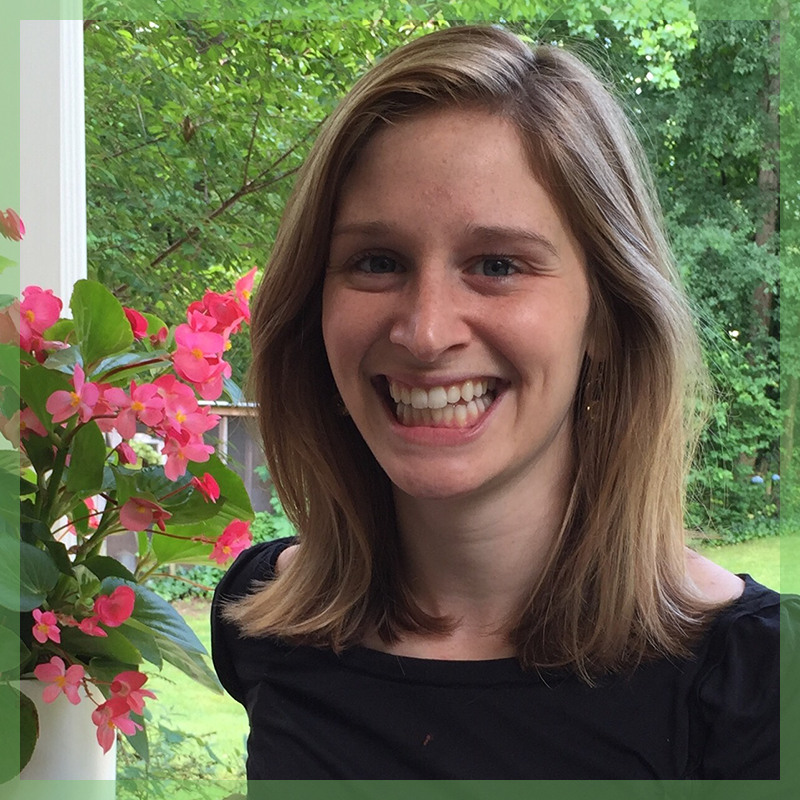 How did the Campus Y shape your time at Carolina and your post-graduation goals?
How did the Campus Y shape your time at Carolina and your post-graduation goals?
The Campus Y was the heart of my Carolina experience. It was at the Campus Y that I met the brilliant, creative, and inspiring students who became my best friends and who remain my best friends to this day.
What inspired your decision to go into law?
I entered UNC with an academic interest in mass incarceration and the criminal legal system, and I thought I would go on to get a graduate degree in the social sciences. I craved some on-the-ground exposure to the criminal legal system, so I spent the summer after my second year at UNC as an intern investigator at the D.C. Public Defender Service. That summer, as I was interviewing witnesses, meeting clients in jail, and assisting with trials, I realized that I was drawn to advocacy rather than academia. It was the right decision – to this day, in every legal aid position I’ve had, the relationships with clients have been the most meaningful part of the work.
What would you say to Campus Y students considering law school?
If we want to see broad social change, we need lawyers, of course, but we also need organizers, teachers, artists, and writers all working toward social, racial, and economic justice. So, to a Campus Y student considering law school, I would say the best thing to do is to find out if you will find meaning and enjoyment in the practice of law. If so, go for it! If not, there are many other paths toward a life dedicated to public service.
What has a law degree helped you achieve?
I graduated from Yale Law School in 2018, and now I’m finishing up a clerkship at the United States Court of Appeals for the First Circuit. This fall I will start a fellowship at the ACLU of Massachusetts, where I will bring litigation combating discrimination against people with Opioid Use Disorder.
What are you most proud of?
I’m in the very first stages of my career in the law, so you’ll have to ask me again in a few years! Hopefully I’ll have done something to make myself and the Campus Y proud.
Vishal Reddy ’16
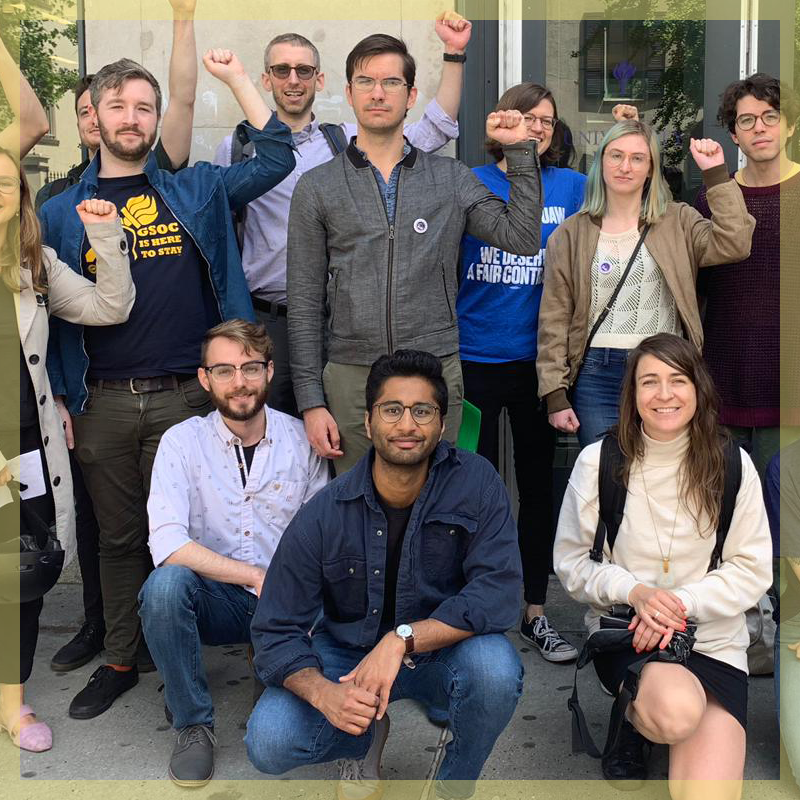 How did the Campus Y shape your time at Carolina and your post-graduation goals?
How did the Campus Y shape your time at Carolina and your post-graduation goals?
Most formatively, the Campus Y immersed me in activist spaces. I wouldn’t have defined myself as an activist or deeply political political person prior to college, but the Campus Y changed that (which I’m very grateful for). As Co-Chair of HYPE, we had to fight hand-in-hand with community activists to ensure a return of after school programming for low-income neighborhoods in Chapel Hill. Later, as Co-President of the Campus Y, our work naturally centered and amplified student activist movements- from Real Silent Sam to the Board of Governors Democracy Coalition. I learned a lot from my fellow student activists in those experiences in terms of how to challenge power. Most importantly though, I learned the importance of community activism in fighting for what’s right. After graduating, I returned to my hometown of Cleveland and sought to continue engaging in activist, movement-building spaces. I worked with various coalitions that fought for homeless advocacy, public transit, and electoral transparency.
What inspired your decision to go into law?
I applied to law school to fight for more inclusive visions of change and to continue amplifying and uplifting justice-centered community movements. My organizing work showed me that lawyers have a role in community movements by supporting them in overcoming the obstacles – sometimes legal, sometimes non-legal – they faced. I was inspired to continue doing movement-building work because my organizing work centered the struggles of working class communities.
Through this work, I learned two major lessons. First, many people and families experience such systemic oppression and live incredibly precarious lives due to no fault of their own. Second, I became firmly convinced that ethical, inclusive change does not come from the top, but instead comes from grassroots community movements.
Additionally, to me, the election results of 2016 made it impossible to ignore that we have long lived in an era of unfettered capitalism advanced by elites on both the left and the right. Law school will hopefully equip me with a tangible set of skills to combat growing inequality.
What would you say to Campus Y students considering law school?
I have found law school to be a really rewarding experience over the past year. It has begun to equip me with movement lawyering skills, connected me to a public interest-oriented community, and challenged me to think in new ways. I urge everyone to partake in movement-building work. However, I’d also emphasize that being an attorney is merely one of the ways to do so. Law school certainly has its downsides (it privileges institutionalist thinking, it can be an inaccessible field, it teaches us to think change can happen only incrementally, it associates self-worth with grades, etc.). But the more I focus on the value my legal education can provide to communities rather than the value it can provide to me, the more fulfilled I am by law school.
What work are you currently tackling?
I am currently a summer legal intern at Detroit Justice Center (DJC). DJC is a movement lawyering, abolitionist organization with a primary focus in ending mass incarceration, but it plays various roles in the community. My work over the summer has thus far covered a wide range of issues. My projects include providing legal services to individuals returning from prison, combatting the surveillance technologies employed by Detroit police, and analyzing the legal avenues available to stop water shutoffs for Detroit’s poorest neighborhoods.
What are you most proud of?
Being involved in organizing work has given me a lot to feel fulfilled by, from securing resources for homeless women and children to building a worker-student coalition in law school. However, I am most proud, not of any specific achievement, but rather the sense of community I have developed through organizing work. Beginning with my Campus Y community, these communities have evolved my conceptions of how social change occurs and taught me that relationship-building is central to any community organizing work. I am proud to be a part of various communities that don’t shy from the harsh realities, but rather know work has to be done.
Yash Shah B.A. ’11, M.A. ’13
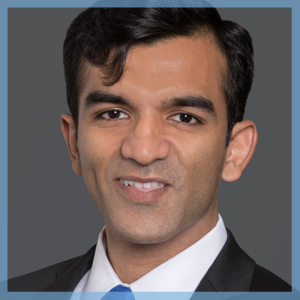 How did the Campus Y shape your time at Carolina and your post-graduation goals?
How did the Campus Y shape your time at Carolina and your post-graduation goals?
My experience at the Campus Y had a formative role in the way I seek to make an impact in the community and in my professional career. As the Director of Development, I had the opportunity to advise Campus Y committees and projects on financial and operational matters. The role of being an advisor fostered my passion for helping others do what they do better. At the same time, my personal involvement in committees such as CEF, Hope Gardens and Nourish taught me the exceptional value of being a member of a team that works towards a common, meaningful cause. I imagine these lessons will be vital to me well beyond my time at Carolina.
What inspired your decision to go into law?
I was inspired to go into the legal profession, because of my interest in the role of law in society and the value that lawyers can provide through that relationship. I view the law as a medium through which the values and goals of a democratic society can be expressed. For instance, many social justice issues can be approached, if not solved, from a legal perspective. In that spirit, lawyers have the privilege to act as trustees of the means by which societies achieve progress.
What would you say to Campus Y students considering law school?
I believe the legal profession is a natural career path for Campus Y students that seek to maintain their interest in social justice. My recommendation is to identify interests that you can take into your career. Law school and the profession provide a broad scope of opportunities to make an impact, so the challenge can be deciding where and how to get involved amongst all the options.
What work are you currently tackling?
Following law school, I joined the banking and finance practice of a global law firm. I’ve gained tremendous insight on how the financial system works in practice as well as the role of policy and regulation. In addition, I am active in the firm’s pro bono program, which is strongly encouraged. Currently, I am working on a team that is representing a family seeking asylum.
What are you most proud of?
The Campus Y provided a platform for me to become active with social causes that I deeply care about. I am proud of the progress realized by our cohort and that many of us continue to promote those underlying values in the paths we have taken since our time at Carolina.
James Waters ’10
How did the Campus Y shape your time at Carolina and your post-graduation goals?
My time at Carolina revolved around the Campus Y. I got involved in my first year by helping with Nourish International’s Hunger Lunch and was always hanging out at the Y. It was the perfect place to study, talk with friends, or even just relax between classes. What I love most about the Campus Y is that there is something for everyone. So many groups are addressing critical issues, and whether you’re interested in raising environmental awareness or working towards criminal justice reform or tackling immigration issues, you can pursue your passion there!
My time as Co-President during my senior year really tested my leadership skills. I had never helped lead an organization as large as the Campus Y, and I grew as a leader.The issues we worked to address at the Campus Y helped me make the decision to work for the Foundation for Sustainable Development in Nicaragua after graduation. I knew I wanted to immerse myself in a different culture and take a risk. After a year in Nicaragua, I started a dual degree program at Duke to earn my J.D. and Master’s in International Law.
What inspired your decision to go into law?
I have a passion for international development, and after working in Nicaragua for a year working primarily in the microfinance sector, I wanted to study International Law to help me understand the structural and legal foundations of the international system.
What would you say to Campus Y students considering law school?
Go for it! I never took a formal LSAT prep course. I just bought the LSAT study guide on Amazon, bought a bunch of practice tests, and took them with me to Nicaragua after graduation to study at night. During the application process, choose about 10 schools you really like, apply to those schools and call it a day. Some people get caught up applying to 50+ schools, which is a bit unnecessary, in my opinion.
You can do pretty much anything with a law degree. You can work for a nonprofit organization, start your own business, work for a law firm or enter the public sector. There’s a ton of versatility with a law degree.
What work are you currently doing?
I’m currently working as a finance associate in Dallas, TX for Winston & Strawn LLP. I love what I do. I help businesses of all sizes get the funding they need to grow their businesses. It’s incredibly fast paced and challenging but worth it. I’m learning a ton.
I also love doing pro bono work. I’ve been able to help individuals avoid deportation, prevent wrongful evictions and even go after sleazy car dealers who take advantage of their customers with the crazy things they put in the fine print of their contracts.
What are you most proud of?
I’ve never forgotten why I went to law school in the first place. I dedicate just as much time to pro bono clients that can’t afford to pay for legal services as I do to any other of our larger clients.
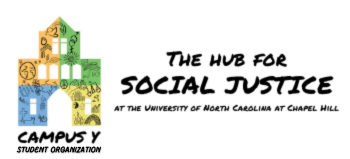
One Response to “Post-grad pep talk: Meet seven Campus Y alumni continuing to pursue justice through law”
Tom Ricketts
Jim Medford, mentioned in the top article about the speaker ban, died today, August 4, 2020.